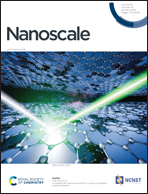Induction of autophagy-dependent and caspase- and microtubule-acetylation-independent cell death by phytochemical-stabilized gold nanopolygons in colorectal adenocarcinoma cells†
Abstract
Collective functionalization of the phytochemicals of medicinal herbs on nanoparticles is emerging as a potential cancer therapeutic strategy. This study presents the facile synthesis of surface-functionalized gold nanoparticles using Bacopa monnieri (Brahmi; Bm) phytochemicals and their therapeutically relevant mechanism of action in the colorectal cancer cell line, HT29. The nanoparticles were characterized using UV–visible spectroscopy, TEM-EDAX, zeta potential analysis, TGA, FTIR and 1H NMR spectroscopy, and HR-LC-MS. The particles (Bm-GNPs) were of polygonal shape and were stable against aggregation. They entered the target cells and inhibited the viability and clonogenicity of the cells with eight times more antiproliferative efficacy (25 ± 1.5 μg mL−1) than Bm extract (Bm-EX). In vitro studies revealed that Bm-GNPs bind tubulin (a protein crucial in cell division and a target of anticancer drugs) and disrupt its helical structure without grossly altering its tertiary conformation. Like other antitubulin agents, Bm-GNPs induced G2/M arrest and ultimately killed the cells, as confirmed using flow cytometry analyses. ZVAD-FMK-mediated global pan-caspase inhibition and the apparent absence of cleaved caspase-3 in treated cells indicated that the death did not involve the classic apoptosis pathway. Cellular ultrastructure analyses, western immunoblots, and in situ immunofluorescence visualization of cellular microtubules revealed microtubule-acetylation-independent induction of autophagy as the facilitator of cell death. Together, the data indicate strong antiproliferative efficacy and a possible mechanism of action for these designer nanoparticles. Bm-GNPs, therefore, merit further investigations, including preclinical evaluations, for their therapeutic potential as inducers of non-apoptotic cell death.

- This article is part of the themed collection: Celebrating the scientific accomplishments of RSC Fellows


 Please wait while we load your content...
Please wait while we load your content...